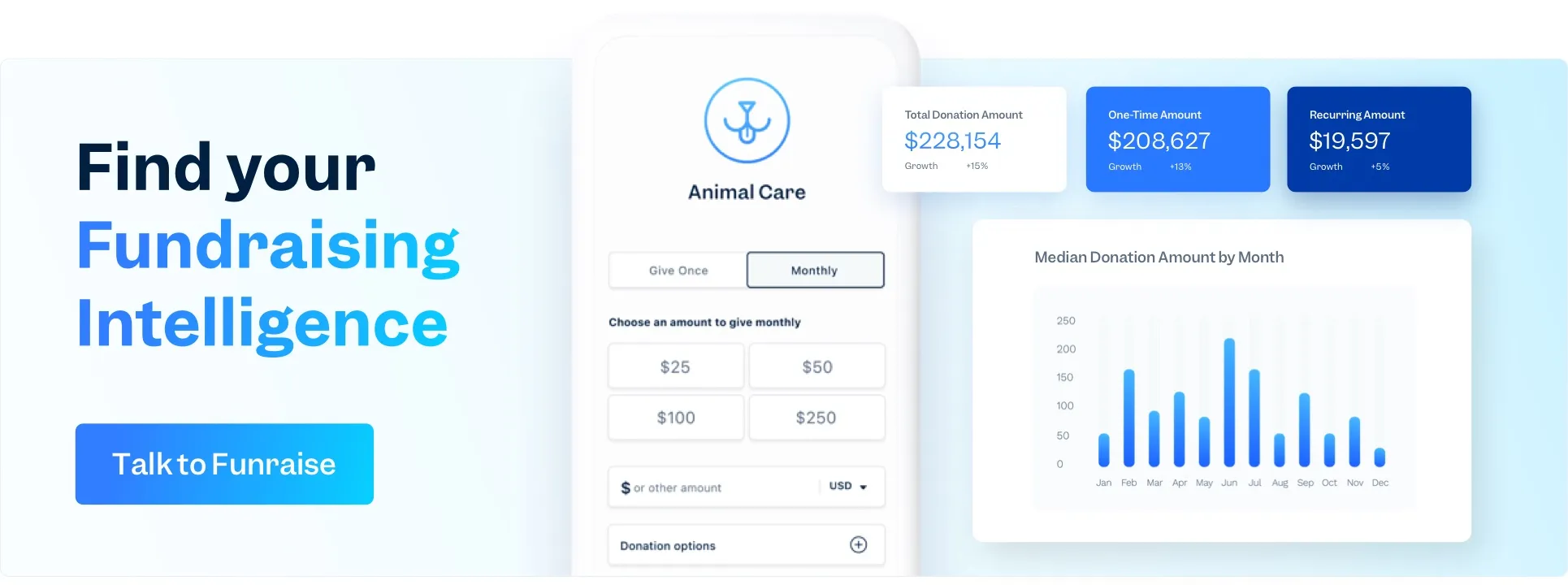As nonprofit folks in the current world, with AI all up in our faces and data coming out our wazoos, one of the most powerful tools at our disposal is Fundraising Intelligence—the strategic use of data and analytics to inform and optimize fundraising efforts.
While looking at Fundraising Intelligence as a tool is easy, harnessing the power of Fundraising Intelligence to drive growth, increase donor engagement, and ultimately achieve our missions more effectively isn't so easy.
Funraise recently joined forces with VeraData, a donor science consultancy equipping nonprofits with the right data to increase philanthropic giving as a measurable component of GDP. Collaborating on a webinar and podcast, and examining data collected through VeraData's Guide to Donor Science and Funraise's in-platform Fundraising Intelligence tool, these nonprofit leaders covered a lot of ground.
We're here to break it all down, sum it up, and provide you with pick-of-the-litter information, so read on!
The power of Fundraising Intelligence
The nonprofit sector has experienced significant growth in recent years, with the number of registered nonprofits in the United States increasing by 30% over the past decade. However, this growth has also led to increased competition for donor attention and resources during a time of heightened need, global crises, and reduced giving. In this challenging environment, Fundraising Intelligence has emerged as a critical factor in determining which organizations thrive and which struggle to survive.
Justin Wheeler, CEO and Co-founder of Funraise, home of the original Fundraising Intelligence tool, emphasizes,
"Funraise has seen firsthand how the power of data intelligence can sustain and accelerate life-changing impact. We're excited to increase the accessibility of this technology because we know nonprofits are poised to launch into a future where actionable insights will increase impact in a big way."
Understanding Fundraising Intelligence
At its core, Fundraising Intelligence is about using data to make smarter decisions. This includes collecting and analyzing information about donors, tracking giving patterns, and using predictive analytics to identify potential high-value supporters.
As Matt Kaiser, Chief Strategy Officer of VeraData, explains in the joint VeraData-Funraise webinar Breaking Free from Tradition: How to Modernize Nonprofit Growth,
"[With] decision support, nonprofits understand not only who they should communicate with, but when and how and that it doesn't need to be the single solution."
Key components of Fundraising Intelligence include:
Donor data management
Collecting and organizing information about donors, including demographic data, giving history, and engagement metrics.
Data analysis
Using statistical techniques and machine learning algorithms to uncover patterns and insights in donor data.
Predictive modeling
Developing models that can forecast future donor behavior and identify potential high-value supporters.
Performance tracking
Monitoring the effectiveness of fundraising campaigns and strategies over time.
The Impact of Fundraising Intelligence on nonprofit growth
The adoption of Fundraising Intelligence has had a significant impact on nonprofit growth and success. According to recent Fundraising Intelligence statistics from Funraise:
- Organizations equipped with Fundraising Intelligence raise an average of 7 times more online annually compared to those without.
- Nonprofits using Fundraising Intelligence grow recurring revenue 1.5 times faster year over year on average.
- As of April 2024, organizations with Fundraising Intelligence have an average of 12% higher donor retention rates.
These statistics are particularly important given the current challenges in donor retention. The Fundraising Effectiveness Project reported that donor retention rates fell to 42.6% in 2022 and declined a further 2.5% in 2023.
Strategies for leveraging Fundraising Intelligence
To harness the power of Fundraising Intelligence, nonprofits should focus on the following key strategies:
Data collection and analysis
The foundation of effective Fundraising Intelligence is high-quality data. Nonprofits should prioritize collecting comprehensive donor information, including:
- Demographic data
- Giving history
- Engagement metrics (e.g., event attendance, volunteer hours)
- Communication preferences
Once data is collected, organizations should use advanced analytics tools, aka Donor Science, to uncover insights and patterns.
Michael Peterman, VeraData's CEO, explains donor science in his own words:
"Donor Science is the ability to look at data in billions of dimensions in seconds. It's the ability to understand infinitely complex combinations of variables and identify trends, habits, preferences, in ways that were previously unimaginable."
Implementing insights for improved fundraising outcomes
The true value of Fundraising Intelligence lies in its application. Nonprofits should use the insights gained from data analysis to:
- Personalize donor communications
- Optimize fundraising campaign timing and messaging
- Identify and cultivate potential major donors
- Improve donor retention strategies
Discussing large-scale fundraising campaigns with Justin Wheeler on the Nonstop Nonprofit podcast, Peterman says,
"...when you use data to analyze the audience, to understand package preferences, to understand timing and cadence, to understand the force multiplier effect of a digital touch... Being able to thread together the name and postal address to the social handles, the IP addresses, the email addresses, the mobile IDs, and understand people's relationship with the different channels gives us insight that is guiding a more holistic decision."
Overcoming challenges in adopting Fundraising Intelligence
While the benefits of Fundraising Intelligence are clear, many nonprofits face challenges in implementing these strategies. Common obstacles include:
- Limited resources and budget constraints
- Lack of technical expertise
- Data quality and integration issues
- Privacy and ethical concerns
To overcome these challenges, nonprofits can:
- Start small and scale up gradually
- Invest in staff training and development
- Partner with technology providers specializing in nonprofit solutions
- Prioritize data governance and ethical data use practices
The future of Fundraising Intelligence in the nonprofit sector
As technology continues to evolve, the future of Fundraising Intelligence looks promising for nonprofits. Emerging trends and technologies include:
Artificial Intelligence and machine learning
AI-powered tools like Funraise's AppealAI will enable more sophisticated donor segmentation, personalization, and predictive modeling.
Real-time analytics
Nonprofits will be able to access and act on donor insights in real-time, enabling more agile and responsive fundraising strategies.
Integration of multiple data sources
Organizations will leverage a wider range of data sources, including social media, public records, and IoT devices, to gain a more comprehensive understanding of their donors.
Enhanced data visualization
Advanced data visualization tools will make it easier for nonprofits to understand and communicate complex data insights.
As these technologies mature, Fundraising Intelligence will become increasingly accessible and impactful for nonprofits of all sizes.
Embracing the power of Fundraising Intelligence
In an increasingly competitive and data-driven world, Fundraising Intelligence has become an essential tool for nonprofit growth and success. By leveraging data analytics, predictive modeling, and other advanced technologies, organizations can gain deeper insights into donor behavior, optimize their fundraising efforts, and build stronger, more sustainable relationships with their supporters.
As we've seen, the impact of Fundraising Intelligence on nonprofit growth can be significant, with organizations experiencing increased donor retention rates, higher donation amounts, and improved overall fundraising effectiveness. While challenges exist in adopting these strategies, the potential benefits far outweigh the costs.
Justin Wheeler, Funraise CEO and Co-founder, aptly summarizes the importance of Fundraising Intelligence: "We're excited to increase the accessibility of this technology because we know nonprofits are poised to launch into a future where actionable insights will increase impact in a big way."
We encourage all nonprofits to take the first steps towards harnessing the power of Fundraising Intelligence. Start by assessing your current data capabilities, identifying areas for improvement, and exploring the many tools and resources available to help you on this journey. With the right approach and commitment, Fundraising Intelligence can transform your organization's ability to grow, engage donors, and ultimately achieve your mission.































.webp)
.webp)











.webp)
.webp)

.webp)
.webp)
.webp)




